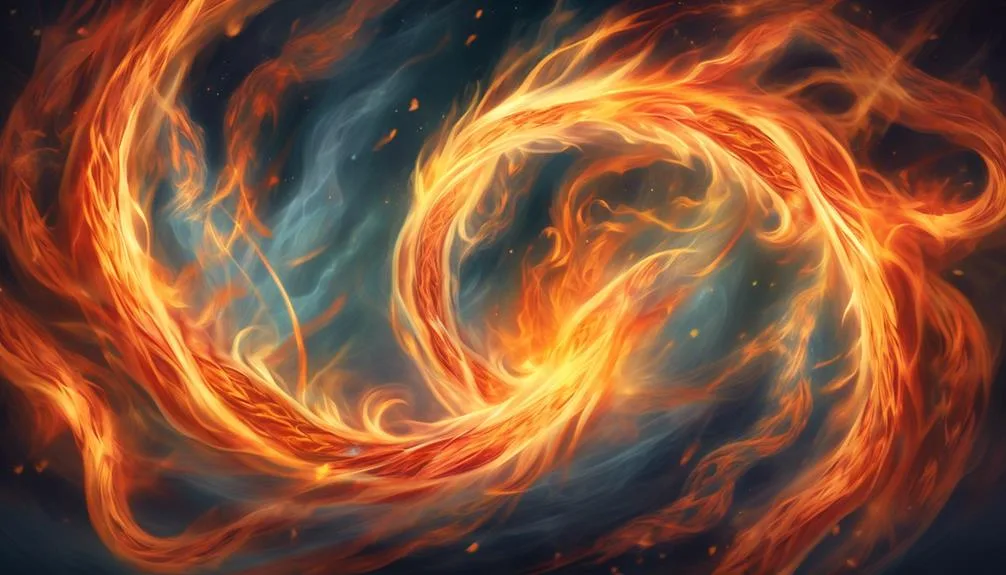The idea of twin flames may sound like it's from a fairy tale, but it actually relates to real-life relationship issues.
A twin flame runner is someone who is drawn to their partner yet pushes them away due to fear of commitment and a desire for freedom, among other reasons.
This article will look into seven key traits of twin flame runners, helping us understand the deeper fears and desires that influence people's actions in relationships.
Key Takeaways
- Fear and avoidance of commitment stemming from deep-seated insecurities and past traumas are common traits in twin flame runners.
- Emotional turbulence and communication breakdown hinder personal growth and connection in twin flame relationships.
- Denial and disconnection, including avoidance strategies and projection of insecurities, can strain the bond with a twin flame.
- Repetitive running and trust issues are often rooted in communication barriers and fear of vulnerability.
Overwhelming Fear of Commitment

One common trait among twin flame runners is their overwhelming fear of commitment, often stemming from deep-seated insecurities and past traumas. You might find yourself dodging serious conversations about the future or feeling claustrophobic at the thought of being 'tied down.'
This isn't because you don't care about your twin flame. Rather, it's your relationship anxiety kicking in, a silent alarm triggered by personal trauma. You're not alone in this. Many struggle with the fear that committing fully might repeat painful patterns from the past.
Understanding this about yourself is the first step toward healing. Recognizing that your fear of commitment is a response to past hurts can empower you to face it head-on, potentially transforming your approach to relationships and love.
Intense Emotional Turbulence

Experiencing intense emotional turbulence is common for twin flame runners, as your feelings can swing wildly from one moment to the next. You're caught in a whirlwind of emotions, often leading to emotional avoidance as a coping mechanism. This can create challenges in turmoil management, making it hard to navigate the intense connection you share with your twin flame.
| Aspect | Impact |
|---|---|
| Emotional Swings | Difficulties in maintaining stable relationships |
| Emotional Avoidance | Hinders personal growth and connection |
| Turmoil Management | Essential for overcoming challenges |
| Intense Connection | Can lead to overwhelming feelings |
| Coping Mechanisms | Key to navigating the twin flame journey |
Understanding these aspects can help you manage the emotional turbulence more effectively, fostering a healthier approach to your twin flame journey.
Sudden Withdrawal and Isolation

Amidst your twin flame journey, you may suddenly find yourself retreating into solitude, pushing away not just your twin flame but also the world around you. This sudden withdrawal and isolation often stem from a deep-seated fear of vulnerability or unprocessed emotional turmoil.
It's not uncommon for a communication breakdown to trigger this behavior, as words fail to convey the complexity of your feelings. In these moments, isolation becomes a coping mechanism, a way to shield yourself from potential hurt or misunderstanding.
However, remember that this phase is temporary. It's a signal that you're in need of healing and self-reflection. Recognizing it as such can help you navigate through this challenging period and eventually open up to communication and connection once more.
Denial of the Connection

You might find yourself denying the intense bond with your twin flame, a clear sign you're struggling to accept the depth of this connection.
This denial often manifests through avoidance strategies, where you might go to great lengths to avoid confronting your feelings or even the presence of your twin flame.
It's not uncommon for you to deflect or dismiss discussions about your connection, leading to a significant communication breakdown between you and your twin flame.
This behavior isn't just about denying the connection to others but also to yourself, creating an internal conflict that further strains your relationship.
Recognizing these actions as forms of denial is the first step toward addressing the underlying issues and moving toward acceptance and reunion.
Repetitive Patterns of Running

One might find themselves caught in a cycle of repeatedly distancing from their twin flame, a behavior that underscores the complexity of this profound connection. You're not alone if you've noticed a pattern where you or your partner pulls away, only to return, then distance again.
Often, this cycle is rooted in communication barriers and trust issues. When you're struggling to openly share your thoughts and feelings, it can feel easier to run rather than confront these challenges. Similarly, if trust hasn't been fully established, the fear of vulnerability might push you away.
Understanding these patterns is crucial; they're not just random occurrences but signals pointing towards deeper issues that need addressing. Recognizing them is the first step towards breaking the cycle and moving closer to a harmonious connection.
Projection of Insecurities

While understanding repetitive running patterns is crucial, it's equally important to recognize how projecting insecurities plays a significant role in the dynamic of a twin flame connection. You might find yourself using self sabotage mechanisms as a way to cope, not realizing that this only seeks insecurity validation.
| Mechanism | Impact | Overcome |
|---|---|---|
| Denial | Hides true feelings | Acknowledge emotions |
| Blame | Avoids responsibility | Accept flaws |
| Withdrawal | Escapes confrontation | Face fears |
| Criticism | Lowers partner's esteem | Practice empathy |
| Comparison | Fuels jealousy | Focus on self-improvement |
These behaviors don't just strain the connection; they act as barriers to genuine intimacy and growth. Recognizing and addressing them is a step towards healing and strengthening your bond.
Desire for Independence and Freedom

Many twin flame runners experience a deep longing for independence and freedom, feeling trapped by the intensity of the connection. This desire isn't about escaping you, but rather, it's rooted in their quest for personal growth. They crave the space to explore who they're outside the twin flame dynamic.
This often manifests as adventure seeking, an urge to try new things and push their boundaries in ways they feel they can't do when tethered too closely to someone else, even their twin flame. It's a complex mix of wanting to grow individually while still feeling the pull of the bond.
Understanding this need can help bridge the gap between longing for freedom and nurturing the unique connection you share.
Conclusion
Recognizing these characteristics in your twin flame runner highlights their own path of growth and fear of deep connection. They showcase a journey filled with avoidance, emotional turmoil, and a struggle for independence, yet they're not a reflection of your worth or the bond you share. Offering understanding and patience is key.
This situation serves as a reminder of the importance of personal growth within any profound connection. Will they return, ready to fully embrace the bond, or will this experience lead to personal transformation for both? It's a profound question that underscores the journey of twin flames, emphasizing the significance of self-discovery and the potential for reconciliation.










